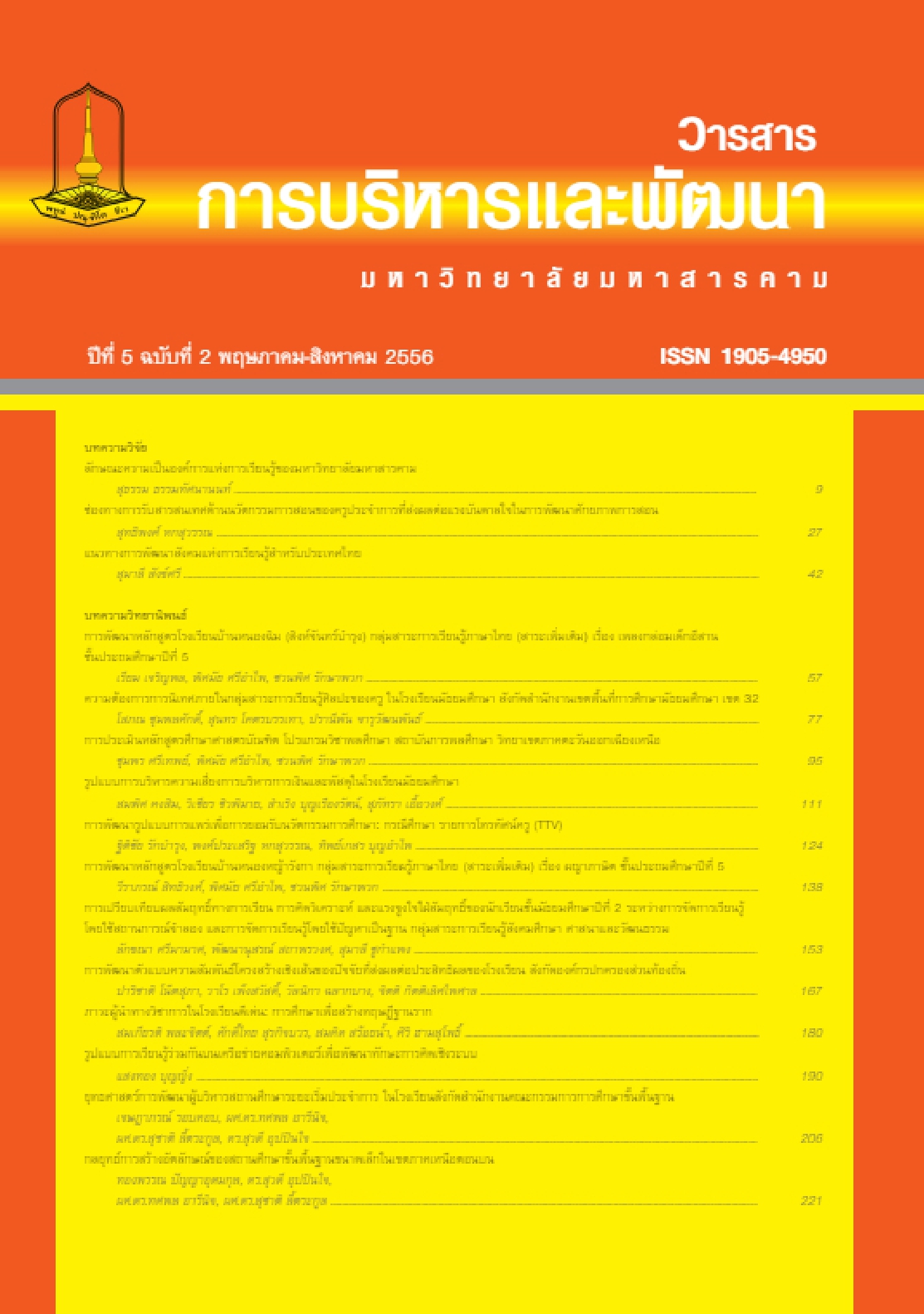ลักษณะความเป็นองค์การแห่งการเรียนรู้ของมหาวิทยาลัยมหาสารคาม
Main Article Content
บทคัดย่อ
การวิจัยนี้มีความมุ่งหมาย เพื่อศึกษาระดับลักษณะความเป็นองค์การแห่งการเรียนรู้ของมหาวิทยาลัยมหาสาคาม ศึกษาระดับปัจจัยด้านสภาพแวดล้อม ปัจจัยด้านการบริหารปัจจัยด้านบุคคล และปัจจัยด้านบูรณาการทางวิชาการ และศึกษาความสัมพันธ์ระหว่างปัจจัยด้านสภาพแวดล้อม ปัจจัยด้านการบริหาร ปัจจัยด้านบุคคล และปัจจัยด้านบูรณาการทางวิชาการกับลักษณะความเป็นองค์การแห่งการเรียนรู้ของมหาวิทยาลัยมหาสาคามกลุ่มตัวอย่าง ประกอบด้วยบุคลากรสายวิชาการและสายสนับสนุนวิชาการ ของมหาวิทยาลัยมหาสารคาม จำนวน 306 คน เครื่องมือที่ใช้ในการเก็บรวบรวมข้อมูล เป็นแบบสอบถามเกี่ยวกับ ลักษณะความเป็นองค์การแห่งการเรียนรู้ของมหาวิทยาลัยมหาสารคาม แบบสอบถามเกี่ยวกับปัจจัยด้านสภาพแวดล้อม ปัจจัยด้านการบริหารปัจจัยด้านบุคคล ปัจจัยด้านบูรณาการทางวิชาการ และสถิติที่ใช้ในการวิเคราะห์ข้อมูล ได้แก่ ค่าคะแนนเฉลี่ย ค่าความเบี่ยงเบนมาตรฐาน ค่าสัมประสิทธิ์สหสัมพันธ์ของเพียร์สัน และสหสัมพันธ์พหุคูณผลการวิจัยสรุปได้ดังนี้
1. ลักษณะความเป็นองค์การแห่งการเรียนรู้ของมหาวิทยาลัยมหาสารคาม โดยรวมและเป็นรายด้านทุกด้าน ได้แก่ ด้านความคิดเชิงระบบ ด้านการมีแบบแผนความคิด ด้านการมีวิสัยทัศน์ร่วม ด้านการเรียนรู้ร่วมกันเป็นทีม และด้านการรอบรู้แห่งตนโดยรวมและเป็นรายด้านทุกด้านอยู่ในระดับมาก
2. ระดับปัจจัยด้านสภาพแวดล้อม ปัจจัยด้านการบริหาร ปัจจัยด้านบุคคล และปัจจัยด้านบูรณาการทางวิชาการโดยรวมและเป็นรายด้านทุกด้านอยู่ในระดับมาก
3. ความสัมพันธ์ระหว่างปัจจัยด้านสภาพแวดล้อม ได้แก่ วัฒนธรรมและบรรยากาศองค์การ โครงสร้างและงานในองค์การ และสภาพแวดล้อมทางกายภาพ มีความสัมพันธ์ทางบวกในระดับสูงกับลักษณะความเป็นองค์การแห่งการเรียนรู้ของมหาวิทยาลัยมหาสารคามอย่างมีนัยสำคัญทางสถิติที่ระดับ .05
4. ความสัมพันธ์ระหว่างปัจจัยด้านการบริหาร ได้แก่ การบริหารการเปลี่ยนแปลงและนวัตกรรม และมาตรฐานการปฏิบัติงาน มีความสัมพันธ์ทางบวกในระดับสูงมากกับลักษณะความเป็นองค์การแห่งการเรียนรู้ของมหาวิทยาลัยมหาสารคาม อย่างมีนัยสำคัญทางสถิติที่ระดับ.05 ส่วนด้านภาวะผู้นำการเปลี่ยนแปลง การมอบอำนาจ และการพัฒนาทรัพยากรมนุษย์ มีความสัมพันธ์ทางบวกในระดับสูงกับลักษณะความเป็นองค์การแห่งการเรียนรู้ของมหาวิทยาลัยมหาสารคาม อย่างมีนัยสำคัญทางสถิติที่ระดับ .05
5. ความสัมพันธ์ระหว่างปัจจัยด้านบุคคล ได้แก่ แรงจูงใจ ความพึงพอใจในงานและความผูกพันต่อองค์การ มีความสัมพันธ์ทางบวกในระดับสูงมาก กับลักษณะความเป็นองค์การแห่งการเรียนรู้ของมหาวิทยาลัยมหาสารคาม อย่างมีนัยสำคัญทางสถิติที่ระดับ .05
6. ความสัมพันธ์ระหว่างปัจจัยด้านบูรณาการทางวิชาการ ได้แก่ การเรียนรู้ในองค์การ การสร้างและถ่ายทอดความรู้ และการจัดการความรู้ มีความสัมพันธ์ทางบวกในระดับสูงมาก กับลักษณะความเป็นองค์การแห่งการเรียนรู้ของมหาวิทยาลัยมหาสารคามอย่างมีนัยสำคัญทางสถิติที่ระดับ .05
Downloads
Article Details
เอกสารอ้างอิง
Ministry of Education (2007). News from the Ministry of Education. Retrieved on 8 February 2007, from http://www.moe.go.th
Chanpen Sitthiwongse (2002). Relationship between creation of empowerment in work and job satisfaction of staff nurses of Srinagarind Hospital. Thesis of Bachelor of Nursing Science (Nursing Administration). Khon Kaen: Graduate School Khon Kaen University.
Jitthawin Chantraboon (2008). Relations between leadership, organizational climate, conflict and dealing with conflicts of head nurses based on recognition of registered nurses of Community Hospital Area 3. Thesis of Bachelor of Nursing Science (Nursing Administration). Phitsanulok: Graduate School Naresuan University. Copied.
Chatchanok Saisuwan (2008). Adjusted influence of vocational teachers and organizational climate as perceived on the causal model of the requirements at individual level in leading to the organization of learning. Thesis of Curriculum and Teaching (Educational Research Methodology). Bangkok. Graduate School Chulalongkorn University. Copied.
Tula Mahasuthanont (2004) Principle of Management and Principle of Administration. Bangkok: Permsup Printing House.
Ministry of University Affairs (2001). Report of the Seminar on Advancement of Thai Education. Bangkok: Ministry of University Affairs.
Narumon Kongpasuk (2005). Learning Organization: a Case Study of Raman Hospital. Master of Arts (Social Development). Bangkok: Graduate School Project of National Institute of Development Administration. Copied.
Namthip Wipawin (1994). Managing Knowledge and Knowledge Warehouse. Bangkok: SR Printing Mass Products.
Nisadal Wechayanont (1998). Concept on Creating Learning Organization. Journal of Public and Private Management 7(1): 1 – 21.
Blanchard, Ken., Carlos, John., Randolph, Alan (2001). Decentralized Organization. Translated by Wannaporn Krailert. Bangkok: Siam Silp Print and Pack. FedEx Delivers.
Pornthida Wichianpunya (2004). Knowledge Management: Basic and Application. Bangkok: Expernet.
------------ . (2004 Kor). Knowledge Management. Bangkok: Expernet.
Porter, Michael E. (2005). Strategy and Internet to Create a Competitive Advantage. Translated by Thitinant Itharat. Bangkok: Expernet.
Wichan Panich (2005). Knowledge Management: Practitioner. Bangkok: Mental Health.
Werawut Makasiranont (2003). Learning Organization to Genius Organization. Bangkok: Expernet.
Werawat Punnitamai (2001). Learning Organization Development. 2nd Edition. Bangkok: Theerapom Literature.
Siriporn Pongsriroj (1997). Organization and Management. 6th Edition. Bangkok: Technique 19.
Office of the Education Council, Ministry of Education (2005). Officials Development Strategic Plan 2005-2008. Bangkok: Prik Wan Graphics.
Bureau of Standards and Evaluation, Ministry of University Affairs (2003). Student Training Course to Support for Quality Assurance within Higher Education Institutions. Bangkok: Sahamitr Printing.
Brown, W.B; & Moberg, D. J. (1980). Organization Theory and Management: A Macro Approach.New York: John Wiley & Sons.
Ceppeteli, E.B. (1995, October). Building a Learning Organization Beyond the Wall. Journal of Nursing Administration. 25: 56 – 60.
Senge, P.M. (1990). The Fifth Discipline:The Art and Practice of the Learning Organization. London:Century Press.
Tempongko, Ma. Sandra B.; et al. (2005). Capacity Building for Health Empowerment: A Case Study.Journal of Southeast Asian Education. 5(1 – 2): 103 – 118.


